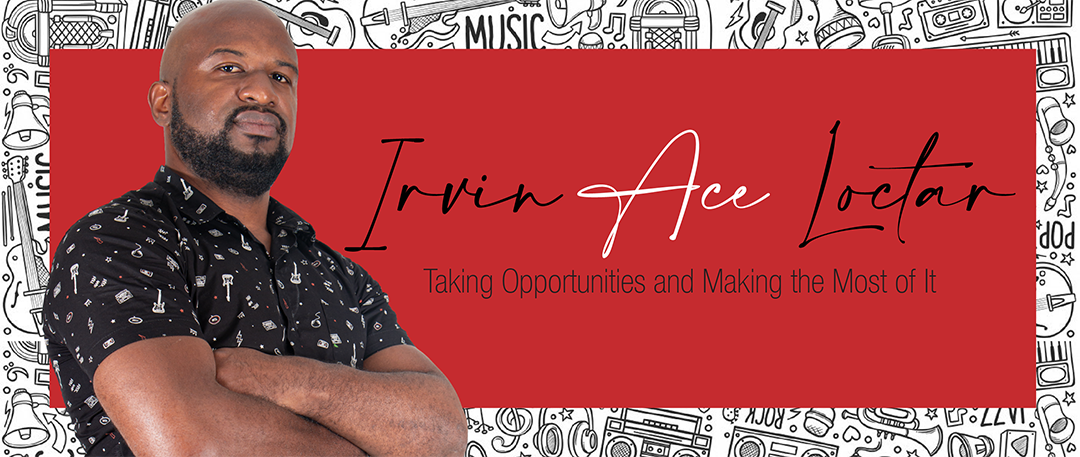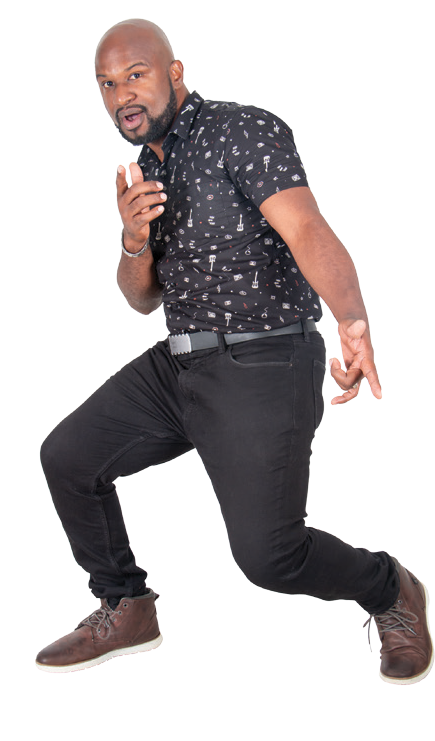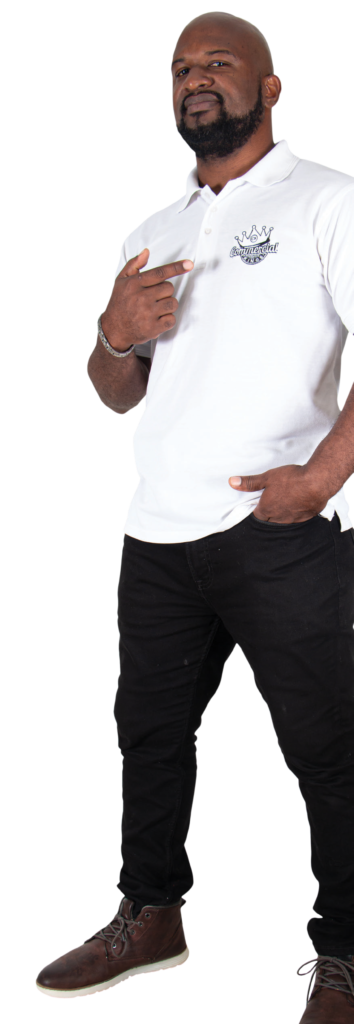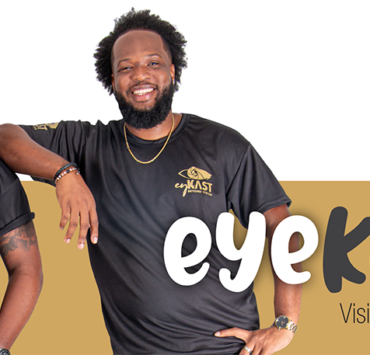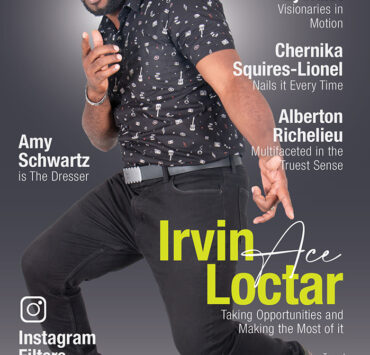A singer, musician and producer, Irvin ‘Ace’ Loctor is everything you’d expect from someone so invested in the entertainment industry. An alumni of Entrepot Secondary School, Irvin began his entertainment career as a young boy. Gifted with his love and talent for music, his ability to play the drums, keyboard and the bass guitar coincided with his skill to make beautiful beats in creative ways. Irvin joined us to share his musical journey, from start to end.
Who is Irvin Loctar and what do you do?
I get asked that question a lot; what do I do? I always say I do a lot of things. I’ve kept myself involved in a lot, most of it being centered around the entertainment industry. I’ve been singing the longest, and I’m also a musician. I play the drums, the keyboards and the bass guitar.
How did you get into music?
My earliest memory of being inspired by music would be the era of Michael Jackson and Lionel Richie. I was really young, and I used to hear the songs on the radio. I used to either put powder on the floor or put socks on to dance. That’s when I think it started for me. At school, I used to get scolded for singing but that later on developed into the love I have for it today. My eldest brother, who is also a musician, got the opportunity to work on a cruise ship when I entered Entrepot Secondary. I thought then that this was it, a lucrative opportunity to travel the world. I made a drum set from tin cans and I would rehearse their musical set and pretend I was performing. Then one of my brothers said I was wasting my time, in so little words. To him, I wouldn’t become what I wanted to be, and I took that as a challenge. I joined a group of like-minded individuals who wanted to do the same things as I and they happened to be girls. They were talented, and I saw how I could fit in. I was the only boy, but we all had a common goal and it worked.
How did you get started after Secondary School, into music?
I started working while I was in secondary school. I was in form three and my brother had returned from the cruise ship. They were looking for work in Saint Lucia and when they found it, the lead singer quit. At that time, I was practicing a lot. I was much better, and my brother heard me and roped me into singing for them. I was nervous; I’d never been on stage before or sang in a band…never really performed for people. When we first went on stage Victoria Rowell who played “Drucilla” on “the young and the restless “was at the hotel, and I had to sing for her because she was in the crowd. I had tons of nerves, but I did the best I could. I got the opportunity to meet her afterwards and she advised me to keep on going because I had a great voice… and that I had to keep practicing. She said; “You only fail when you stop”. That is by far the best advice I’ve ever received.
What was your first job?
My first job was with my brother. As soon as I left school in September of 1996 I had two waiting job offers. One with a local band called Rhythm Crazy and another band called Axis that was about to go on the cruise ship. The latter I chose because I admired the idea of travelling and what not. We did an Eastern Caribbean run from New York to Puerto Rico, the Cayman Islands, then back up to NY and Bermuda back to back. We’d then went as California through the Panama Canal and back to the West Indies. I worked the Celebrity Cruise Line, between the Zenith, Horizon and The Summit.
Tell us about your journeys and your contributions to the musical industry both here and abroad.
I’ve been very fortunate to have met the right people and make the right mistakes early, and learned from them. Off and on while I was still on the cruise ship, I’d make rap music with my friends and my brother noticed so he encouraged me with that. He introduced me to a Jamaican DJ at Sandals named Courtney Taylor. So Courtney gave me a challenge, he gave me a keyboard and sampler that I never used before. Three hours later he came back and I had remade the Janet Jackson beat for “Got til It’s Gone” and he was so impressed he said come back tomorrow. This man then taught me everything he knew, over the course of several years altogether. Every day after school I’d go to his apartment and he’d teach me about sound and recording and what not.
My first published production was with Mr. Vegas. At the time I was making lots of beats from my makeshift studio in my bedroom and sending it to a friend in Florida. He then sent those beats to DJ Delano. Delano happened to be driving with Mr. Vegas while playing my beats so Vegas asked about them and then a few weeks later he was in St. Lucia. One week after that he flew in a Grammy Award winning producer called Derrick Perkins. We ended up doing 3 tracks, all in my bedroom and I got a publishing deal at that time. Those songs were “Oh what a night ft. Jackie”, and the other two songs were on the “Violin Riddim” that I made. From that I got a publishing contract that I signed without reading, because I saw money. Later on I realised that I signed away all my rights for those songs. That experience started my journey in the music business. Courtney then taught me more about the business side of it. Then I was able to sign and work with Nicole David. The first song we did in 2003 was Matée and Shou Fly (doh bother me). Thereafter we did a whole 18 track album, which is where Thygeson Penn Joseph came in. Thygeson is a friend from school and a good musician. The next artist I worked with and signed was Ricky T, producing songs like Container, Pressure Boom. We then signed Teddyson John and Isla Man, later on we worked with Mantius, Kakal, Skinny Fabulous, Kes ,Bunji, Fayann, Benjai, Fireman from St. Vincent. Machel Montano, Lil John happened later on.
What standout challenges have you faced along the way?
The challenge that I still face is that of education about the whole of the music business. I believe that what we did was so far ahead of what was being done in the country at the time, but we alone could not move the industry forward. The lack of vision and support system failed us in getting bigger faster. Back then a lot of the artists didn’t believe that, that kind of success could be had simply because they had never experienced that journey. Foreign collaborations weren’t seen as a thing back then. We had big plans but a lot of people didn’t understand how we were getting them done. There was a lot of fighting against how we were moving forward by others in St Lucia’s infant industry. It hurt the group to the point that fighting for the advancement of the industry was taking precedence over family and personal finances. We made the decision to break up SLU Records and not renew artists contracts.
Tell us about the transition you made from producer to artist and making it to Jazz?
From 2006 I have been on Main Stage Jazz but not as a feature artist. I’ve performed with Boo Hinkson for a long time. In 2013 I got the opportunity to perform on Main Stage and I said no, they asked why and I said because the conditions under which I were to perform would not allow me to be exposed to international audiences who would have most likely showed up later in the night after my set would have finished. At the time I felt like I’d be doing it only for the money and at the time that didn’t impress me. I told them that if I’m doing this I wanted the advantage of having my own sound engineer and my own stage team because I understood how the festival worked with time constraints.
They granted those requests and I invited Mr. Vegas BiG Tigger from BET. We had a pretty good performance- opening for The Jacksons and Ginuwine.
In 2016 I got another opportunity, and I made the similar requests. This time though, I have any guest artists; only my band two background singers and my engineer. Superstar Omarion opened and I were the second act just before the legendary Kassav. That year was very memorable.
Which achievement means the most to you, the one that you will never forget?
That moment hasn’t come yet for me, but there are a few that are right up there. Getting an artist signed to a major record and publishing label, working with international artist Maxi Priest. Working with a Grammy award winning producer is one as well. We at Studio758 have won Soca Monarch titles in 5 countries (St. Lucia, St. Vincent, Grenada, Guyana and Trinidad). Being nominated for 8 International Soca Awards is another one. And to this date being the only people to receive 5 awards in one night is pretty significant. Also as a side note, I had the privilege of being invited to the White House as part of a delegation with Ronald ‘Boo’ Hinkson back in 2013.
How do you see yourself evolving as a producer, as a person?
They always say that success in the music industry is based on your latest project. For me evolving is finding the next artist, that next project that’ll get me up there. There’s no timetable on it, it can happen at any time, So it’s just a matter of keeping up with the technology and the connections that I’ve made over the years. I’ve been doing more of educating artists and giving back in the mean time.
Tell me about commercial kings…
Commercial Kings is something that was part of the vision board back when I was 15. We’d go up on a hill somewhere and imagine what the future would be like. We thought that we’d be popular rappers, and doing commercials for companies. When we started Rhythm FM in 2005 it was always something that we wanted to do; marketing agency. It was in 2013 I made it official and launched Commercial Kings. I’ve worked with Digicel, LUCELEC, the VAT Office, M&C Home Depot, KFC St. Lucia and KFC Dominica. I really can’t name them all. I do the voicing, jingles, we do copywriting as well, we strategize and implement till the project finished.
What advice would you give to an up and coming entrepreneur?
Understand finances. Ideas can evolve and change but the truth about finances remains. You should try to spend less, and set up specific plans for growth. You pay your taxes, you pay your employees (laughs). Things like that are very important. You must be able to set up a plan for your business to grow to a point where you don’t have to be there everyday. As an entrepreneur if you’re doing the same thing all the time for all these years you’ll just be a business owner and not an entrepreneur.

